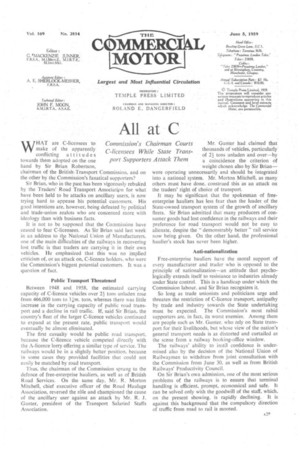All at C Commission's Chairman Courts C-licensees While State Transport
Page 31

If you've noticed an error in this article please click here to report it so we can fix it.
Supporters Attack Them WHAT are C-licensees •to make of the apparently conflicting attitudes towards them adopted on the one hand by Sir Brian Robertson, chairman of the British. Transport Commission, and on the other by the Commission's fanatical supporters?
Sir Brian, who in the past has been vigorously rebuked by the Traders' Road Transport AssociatOn for what have been held to be attacks on ancillary users, is now trying hard to appease his .potential customers. His good intentions are, however, being defeated by political and trade-union zealots who are concerned more with ideology than with business facts.
It is not to be supposed that the Commission have ceased to fear C-licensees. As Sir Brian said last week in an address to the National Union of Manufacturers, one of the main difficulties of the railways in recovering lost traffic is that traders are carrying it in their own vehicles. He emphasized that this was no implied criticism of, or an attack on, C-licence holders, who were the Commission's biggest potential customers. It was a question of fact.
Public Transport Threatened Between 1948 and 1958, the estimated carrying capacity of C-licence.vehicles over 21 tons unladen rose from 466,000 tons to Lm. tons, whereas there was little increase in the carrying capacity of public road transport and a decline in rail traffic. If, said Sir Brian, the country's fleet of the larger C-licence vehicles continued to expand at the present rate, public transport would eventually be almost eliminated.
The first casualty would be public road transport, because the C-licence vehicle competed directly with the A-licence lorry offering a similar type of service. The railways would be in a slightly better position, because in some cases they provided facilities that could not easily be matched by road transport.
Thus, the chairman of the Commission sprang to the defence of free-enterprise hauliers, as well as of British Road Services. On the same day, Mr. R. Morton Mitchell, chief executive officer of the Road Haulage Association, reversed the role and championed the cause of the ancillary user against an attack by Mr. R. J. Gunter, president of the Transport Salaried Staffs Association. Mr. Gunter had claimed that thousands of vehicles, particularly. of 2} tons unladen and over—by a coincidence. the criterion of weight chosen also by Sir Brian— were operating unnecessarily and should be integrated into a national system. Mr. Morton Mitchell, as many others must have done, construed this as an attack on the traders' right of choice of transport.
It may be significant that the spokesman of freeenterprise hauliers has less fear than the leader of the State-owned transport system of the growth of ancillary fleets. Sir Brian admitted that many producers. of consumer goods had lost confidence in the railways and their preference for road transport would not be easy, to alienate, despite the "demonstrably better" rail service now being given. On the other hand, the professional haulier's stock has never been higher.
Anti-nationalization Free-enterprise hauliers have the moral support of every manufacturer and trader who is opposed to the principle of nationalization—an attitude that psychologically extends itself to resistance to industries already under State control. This is a handicap under which the Commission labour. and Sir Brian recognizes it.
So long as trade unionists and politicians urge and threaten the restriction of C-licence transport, antipathy by trade and industry towards the State undertaking must be expected. The Commission's most rabid supporters are, in fact, its worst enemies. Among them are people such as Mr. Gunter, who rely on State transport for their livelihoods, but whose view of the nation's general transport needs is as distorted and curtailed as the scene from a railway booking-office window.
The railways' ability to instil confidence is undermined also by the decision of the National Union of Railwaymen to withdraw from joint consultation with the Commission from June 30, as well as from British Railways' Productivity Council.
On Sir Brian's own admission, one of the most serious problems of the railways is to ensure that terminal handling is efficient, prompt, economical and safe. It can be solved only with the goodwill of the staff, which, on the present showing, is rapidly declining. It is against this background that the compulsory direction of traffic from road to rail is mooted.




































































































































